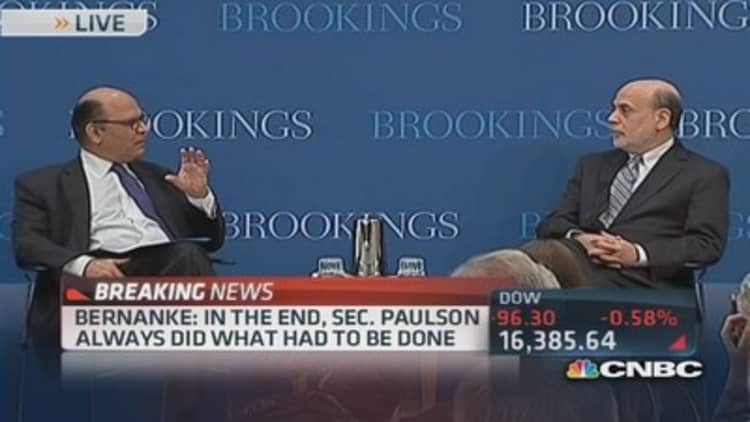Hedge funds, asset managers and other creditors of Lehman Brothers' European arm will next month be fully paid out from money recovered from the carcass of the bank and could get an extra £5 billion ($8.3 billion).
PwC, the administrator of Lehman Brothers International Europe (LBIE), is paying a fourth dividend of 7.8 pence in the pound to unsecured creditors on April 30, which will lift payouts to 100 percent after three bigger dividends in the past 15 months.
(Read more: Freddie Mac gets(some) money back from Lehman)
PwC estimated another £5 billion of surplus cash could be paid to creditors, but any extra cash cannot be paid until there is agreement on how it is shared.
"Five billion pounds is a reasonable estimate. It depends on where we end up with the further recoveries of cash we are seeking and the quantity of creditors whose claims will eventually be agreed," said Tony Lomas, lead administrator for LBIE and partner at PwC.
That means hedge funds and other specialist distressed debt investors who gambled on how much money could be recovered from LBIE could make hundreds of millions of pounds, albeit after waiting several years.
(Read more: What might have been, and the fall of Lehman)
It is hard to track the owners of the debt, but Lomas said more than half was in the hands of distressed debt investors.
Industry sources have said investors have included big names such as Baupost Group and Elliott Management.
Creditors' claims are trading at near 145 percent in a secondary or"grey" market, indicating investors expect more than £5 billion of surplus will be paid. That grey market price plunged as low as 10 percent in the weeks after Lehman's collapse, but has steadily risen in the last five years.

The collapse of U.S. investment bank Lehman Brothers in September 2008 plunged the global financial system into chaos and its European arm, based in London, was the largest and most complex part of the group because it was a hub for trading and investments spanning asset classes and dozens of countries.
The administrators have recovered money by unwinding derivatives contracts and share trades, and winning several legal battles over other parts of the former bank.
Lomas said the full payout of claims showed regulators and central banks developing plans to prevent a repeat of the financial crisis need to make sure banks have enough liquidity to withstand a crisis, and not just focus on capital strength.
(Read more: Bank regulators are actually increasing risk in the system)
"In times of distress customers panic and want their money or assets back, so in a major, complex financial institution the liquidity needs will be as significant as the balance sheet needs," Lomas said.
PwC is expected to return about £40 billion in total to LBIE's creditors, including near £23 billion for trust claimants and about £16 billion for up to 3,400 unsecured creditors.
Surplus cash could be paid later this year if creditors agree to a proposal to be made soon made by PwC, which will propose a split based on interest payments, foreign exchange moves and the claims of subordinated debt holders. Unsecured creditors can get 8 percent interest a year under UK law.
Follow us on Twitter: @CNBCWorld

